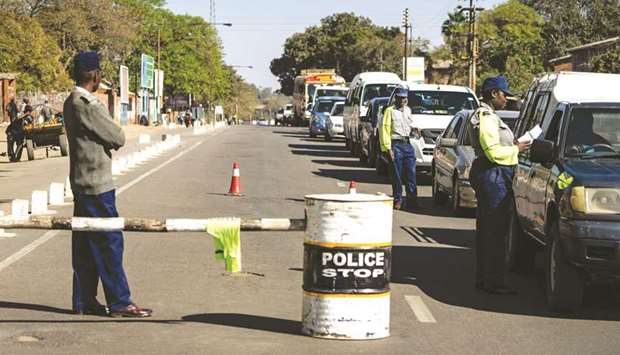Hundreds of police backed by soldiers and army helicopters deployed yesterday in the Zimbabwean city of Bulawayo to prevent an opposition protest from taking place, a show of force that stopped a demonstration for the second time in four days.
The Movement for Democratic Change’s (MDC) had called the Bulawayo event as it looks to rally support against President Emmerson Mnangagwa’s government, which it accuses of ruling with an authoritarian streak and blames for the country’s worst economic crisis in a decade.
Authorities banned the march on Sunday and a court upheld this yesterday. Magistrate Tinashe Tashaya, dismissing an MDC appeal, ruled that police followed the law in stopping the protest and that it could turn violent.
The High Court had on Friday dismissed an MDC challenge against a police ban on its demonstration in the capital, Harare.
MDC lawmaker Innocent Gonese told reporters that the party disagreed with the two court rulings but would press ahead with protests in three other smaller cities starting today.
“We are going to sit down and review the situation in regard to the decision we are going to take in the event that these (police) prohibitions are issued willy nilly,” said Gonese.
The party called off its protest on Friday in Harare after police there rounded up its followers and dispersed them with batons and water cannon and tear gas, prompting many shops and businesses to close.
In Bulawayo yesterday, large contingents of police patrolled on foot, horseback and in vehicles, setting up checkpoints on roads into the city, searching cars and people for weapons, and cordoning off the MDC offices and the magistrates court.
There were no reports of violence in the city, which is an MDC heartland. “The law (used to ban the protest) is clearly unconstitutional and unjust but we have an obligation to comply because we are a peaceful organisation,” David Coltart, a Bulawayo lawyer and MDC senator, told Reuters yesterday.
Eight MDC officials, including its national chairwoman, were freed on bail by magistrate Tashaya after being charged with publishing falsehoods.
They were arrested on Saturday as they distributed pamphlets urging residents to attend Monday’s march.
Bulawayo saw massive looting and destruction of property in January as protests against a steep rise in the price of fuel turned violent, triggering an army crackdown that killed more than a dozen people.
Those deaths undermined a pledge by Mnangagwa to put an end to the repressive political climate that characterised much of his predecessor Robert Mugabe’s 37 years in power.
The protest campaign, which the MDC intends to take to two other cities today and tomorrow, is again casting a spotlight on that promise, a year after Mnangagwa was elected in a vote the party alleges was rigged.
Mnangagwa, 76, is also struggling to convince the growing ranks of the poor that austerity measures and other reforms can trigger an economic recovery.
Anger is mounting over triple-digit inflation, rolling power cuts and shortages of US dollars, fuel and bread.
Former Mugabe VP flees anti-corruption probe
Zimbabwe’s former vice president yesterday fled from anti-corruption questioning after he was summoned over alleged criminal abuse of office, officials said.
Phelekezela Mphoko, 79, who served under long-time ruler Robert Mugabe, was due at the police in Bulawayo, the country’s second city, to record a statement on the allegations.
But he drove off as soon as officials from the Zimbabwe Anti-Corruption Commission (ZACC) approached his car.
“We had agreed to meet at the police post at the magistrate’s court to record a warned-and- cautioned statement and have his fingerprints taken but when our officials approached his car, he drove away at high speed,” ZACC spokesman John Makamure told AFP.
“He is now a fugitive from justice,” the spokesman said, facing accusations of ordering the release from police custody of a chief executive officer and a non-executive director of the state-run roads authority.
Mphoko was, along with current president Emmerson Mnangagwa, one of two vice presidents at the time of the ouster by the military of Mugabe in November 2017. He left the country as the coup unfolded but later returned.
An attempt to arrest him by ZACC last week was blocked by his family.
ZACC had tweeted on Friday that it was “sad” that Mphoko had “refused to collaborate with the enforcement officers and unfortunate that he and those around him believe that they are above the law”.
Lawyer Zibusiso Ncube told AFP that they had an agreement with ZACC that yesterday he would sign a statement at the police “but when we got there they said they (the police) had instructions to detain him”.
“He drove away and is at home.”
The lawyer said the ex-vice president was prepared to appear in court to answer the charges, but “Mphoko claims he heard from impeccable sources that if he is detained, he will be injected with a poisonous substance”.

Police officers conduct searches on vehicles along a major road leading into Bulawayo yesterday.
